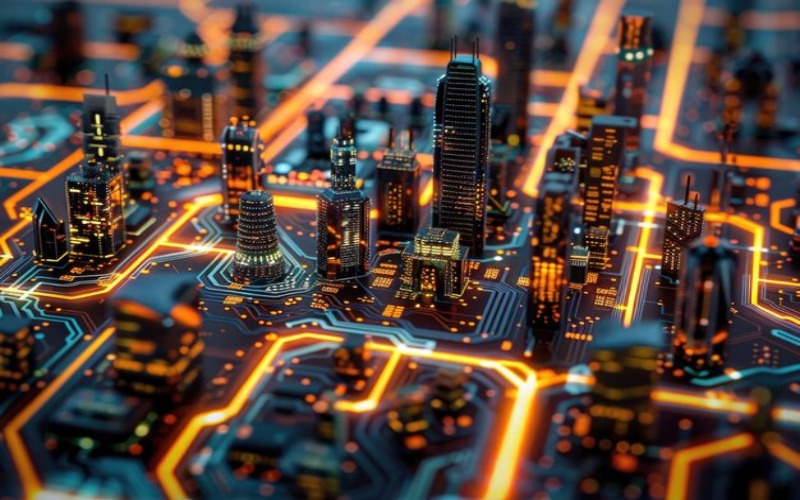Back in the day, the term Silicon Valley called to mind a vast piece of land covered in the popular chemical element from the periodic table. While it’s not actually so, the Valley is undeniably a strong force in cultivating entrepreneurship, collaboration, and evolution.
Coined after semiconductor and computer-related industries, the term “Silicon” has grown to cover diverse technology sectors. The Southern-based region of the San Francisco Bay Area is home to big names like Apple, Alphabet’s Google, and Netflix, and it is a magnet for growing companies seeking to thrive in its landscape and use its resources. Here’s how it has changed the world in a nutshell.
Silicon Valley’s Persistent Influence on the Tech Sphere
Silicon Valley is at the forefront of groundbreaking technologies. These days, the key areas on its watchlist include artificial intelligence, machine learning, augmented reality, and quantum computing.
Generative AI has made “the loudest entrance”, according to a McKinsey report, with a projected $4.4 trillion in economic value. What this means for the Valley, and the world at large, is nothing short of development. You’ll see more companies tapping into content generation, personalized user experiences, and efficient automation.
Take the entertainment sector, for example. Generative AI may be a foundation for creating lifelike virtual actors and immersive environments. If you’ve seen that Joan is Awful episode from Netflix’s Black Mirror, you might have an idea of how it works. We see Streamberry, a Netflix copycat, using a quantum computer and generative AI technology to gather real-time data from people’s devices and create virtual actors.
In the real-life sense, we already have quantum computers – just not as advanced as movies make it seem. But we have the likes of OpenAI’s Dall-E 2 already using Generative AI. It’s a tool that allows you to generate unique images and artworks with just a short text description. Years ago, it would’ve seemed like sorcery to conjure such materials instantly.
Dynamic Startups and Disruptive Forces
We can’t talk about Silicon Valley without the startups and companies that are disrupting traditional industries. These are the newcomers and long runners who are challenging the status quo.
In November 2022, OpenAI released ChatGPT, and Silicon Valley was thrown into a frenzy. The New York Times says, “Turning artificial intelligence into actual products that individuals and companies could use became the priority” for Meta, Alphabet, and more. It was so new and revolutionary that they remapped their plans and called emergency meetings. At the time, Google already had its own AI model in the works.
ChatGPT was the farthest we’ve seen AI come, over the years. It could write essays students struggled with for hours in seconds, create content marketers took days to structure, and even write code. Though it wasn’t perfect, it became an idea pool for any creative person to tap into. Many businesses have saved over $100,000 since adding ChatGPT to their workflow.
Alphabet is another name not to be left out of the discussion. Since its reformation in 2015, the global tech company has since been establishing projects beyond Internet search. Alphabet now oversees numerous subsidiaries, including Calico, a biotechnological entity dedicated to extending the human lifespan.
Currently, it’s commenced the dosing of the first participant in its clinical study of Vanishing White Matter, an extremely rare disease that affects the brain and threatens numerous damages, including motor skills decline, muscle stiffness, and even paralysis. Waymo is another remarkable brand name and is the genius behind the company’s self-driving cars.
Next, we have Elon Musk’s SpaceX, the company aiming to cut space transportation expenses and colonize Mars. It launched its first rocket, the Falcon 1, in 2005, and like all great inventions, it wasn’t immediately successful. After numerous failed launches and bankruptcy looming overhead, the company recovered and built the Dragon 1 in 2010. It completed 23 cargo missions to the International Space Station (ISS) before retiring in 2020.
Years later, Billionaire Jared Issacman organized a private spaceflight in 2021. He accompanied three passengers on a journey aboard Musk’s Falcon 9 rocket. It was intended to be a charitable mission, which successfully raised over $243 million in donations for the St. Jude Children’s Research Hospital.
The Resounding Impact on Everyday Existence
Silicon Valley’s influence doesn’t end at the local scene — it has a worldwide impact too. The Health sector continually witnesses the benefits of Silicon Valley’s influence. Apple and Fitbit are recognizable in wellbeing enhancement. With a smartwatch or wristband, you can monitor your heart rate, sleep patterns, and other metrics.
Mobile health apps also provide remote access to healthcare services, canceling the need to visit hospitals with long consultation queues that can be ironically stressful. The Health Records app on iOS works towards that effort, enabling you to see and track all your health info in one place. You can even share it with your doctor for better insights.
Autonomous vehicles, such as Waymo and Tesla’s self-driving cars aren’t commonplace yet, but they continually align with safer and efficient transportation. More importantly, sustainability and environmental friendliness. They’re designed to optimize routes, reduce traffic jams, and enhance fuel efficiency.
Many of them are electric, meaning they produce fewer emissions and are kinder to our planet. Statistics reveal that in 2030, level 0 to 1 automated vehicles should reduce the likelihood of collisions by 29% compared to vehicles without any automation. Level 4 or 5 AVs will reduce them by 76%.
Personalization is also a gain as streaming services continue to analyze and use consumer data in offering personalized content experiences. Netflix is already in the habit of monitoring what you watch, the time of day, the devices you use, and the duration you spend online. Additionally, smartphones, social media platforms, and cloud computing solutions from Silicon Valley companies have become the norm everywhere, connecting thousands of people easily.
Challenges, Criticisms, and a Trailblazing Future
Silicon Valley is a significant innovation hub and a name many won’t forget for years. However, with fame comes great criticisms, which the region is not without. It has faced many ethical scandals and controversies that make consumers and investors raise questioning eyebrows.
Among them is the Theranos scandal that rocked the Valley. The blood testing company claimed that their technology could perform over 240 tests with just a finger prick, a hype that raked in tons of investors. Upon exposition in 2015, Journalist John Carreyrou revealed that not only was the technology inaccurate, but the company didn’t even use it for blood testing.
Such incidents contribute to trust issues for Silicon Valley, calling for scrutiny in the face of grand promises. Privacy concerns with user data, workplace discrimination, and the prioritization of technologies before people are also challenges stakeholders are wary of.
To rectify these issues, there needs to be transparency, rigorous ethical standards, accountability, and diversity across all industries within the Valley’s sphere.











